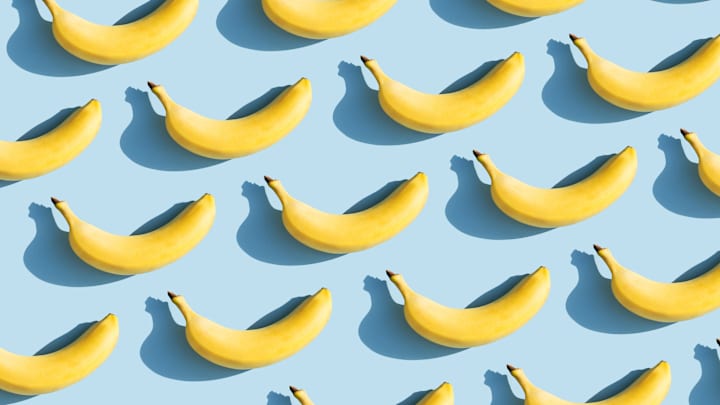Bananas might be one of the most frustrating fruits in the produce aisle. Unlike oranges, apples, or watermelon, which need only be inspected for bruises, bananas are sensitive to capricious selection. Buy them too early and they’ll sit on your counter for days, green and barely edible; buy them too late and they’re destined to be mashed-up for a recipe (bread, pudding) before they turn into a brown glob.
But is there really an optimal time to buy bananas, or is it as foolish as trying to time the stock market? Below, we break down some helpful things to keep in mind the next time you’re at the supermarket.
- The Right Time to Buy Bananas
- How to Store Bananas
- Is It Safe to Eat Green Bananas?
- Should You Wash Bananas?
The Right Time to Buy Bananas
To understand the volatility of the banana, it helps to learn something about its ripening process. Once picked, seeds within the banana release ethylene gas and carbon dioxide, which turns the banana’s complex, starchy carbs into sugar. Pectin (fiber) contributes, too, shifting the banana from a firm consistency into something softer. This all facilitates the transformation from green to yellow to, eventually, a splotchy brown.
Choosing a banana on this color spectrum should be informed by when you plan on consuming it. If you want to eat them immediately after purchase, it’s best to choose a bunch that’s yellow with a handful of brown spots and no green coloring. This is the ideal ripe banana, good for immediate ingestion and edible for a couple of days before they get overripe.
If you anticipate you won’t be consuming any bananas for several days, then it’s better to choose bananas that have some—but not a lot—of green. This will give the banana a few days to ripen. (If you’re unsure of the banana’s status, you can try breaking off the stem. If it’s hard to snap, that means it’s not yet ripe.)
How to Store Bananas
In warmer months and without air conditioning, bananas will ripen more quickly. (And may even retain some green coloring even though they’re ideal to eat.) Some endorse putting bananas in a brown paper bag to speed the process, though it’s unclear whether this works reliably.
Want to keep bananas longer? You can move bananas to a cooler (65°F) spot or refrigerate them, which slows the ripening process. In fact, cold storage is how bananas are transported from harvest to store without turning into brown goo.
You can also delay ripening by covering the stems with tape or plastic, something grocery stores often do.
But suppose that, despite your best efforts, you want a banana and the only option is the green one sitting on your counter. Should you eat it?
Is It Safe to Eat Green Bananas?
Buying bananas at the right time is one thing. Choosing when to eat them is another. Generally, most people find the soft, sweet taste of a yellow banana preferable to the waxy, slightly bitter green banana. But is there any more to it?
Consider the ripening process described above. Because bananas ripen by converting complex starches into simple sugars, a ripe banana is likely to have more of an impact on your blood sugar levels than a green one.
Green bananas also have more pectin, which breaks down as it gets softer. Because it’s more fibrous, some people may find that under-ripe bananas cause some mild bloating or digestive upset. Otherwise, their micronutrient profile (potassium, vitamin B6, and vitamin C) will largely remain the same. A green banana is perfectly safe to eat, just not necessarily the most pleasant.
Should You Wash Bananas?
Most people wash fruits like apples if they intend to eat the skin. Bananas, however, are often consumed right off the counter. But it’s still a good idea to rinse them. The reason? Fruit flies.
The tiny pests can often accompany bananas into the home, laying eggs in the peel and waiting for the right time to hatch. Rinsing the bananas under water for 30 seconds will do away with most of the eggs, along with any lingering contaminants or bacteria. So long as you dab them dry, washing shouldn’t affect the ripening process one way or the other.
More Ways to Live Smarter:
